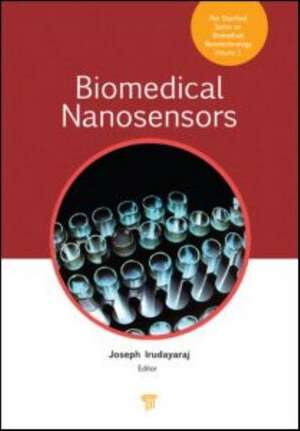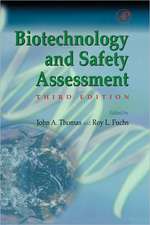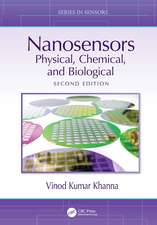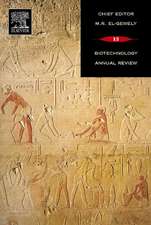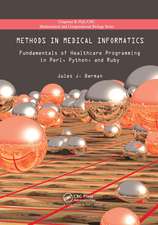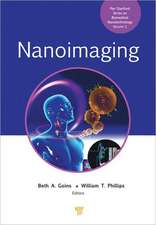Biomedical Nanosensors: Jenny Stanford Series on Biomedical Nanotechnology
Editat de Joseph M. Irudayarajen Limba Engleză Hardback – 21 noi 2012
Preț: 907.61 lei
Preț vechi: 1106.84 lei
-18% Nou
Puncte Express: 1361
Preț estimativ în valută:
173.73€ • 188.77$ • 146.02£
173.73€ • 188.77$ • 146.02£
Carte tipărită la comandă
Livrare economică 21 aprilie-05 mai
Preluare comenzi: 021 569.72.76
Specificații
ISBN-13: 9789814303033
ISBN-10: 9814303038
Pagini: 410
Ilustrații: 98 b/w images and 32 color images
Dimensiuni: 178 x 254 x 28 mm
Greutate: 0.93 kg
Ediția:1
Editura: Jenny Stanford Publishing
Colecția Jenny Stanford Publishing
Seria Jenny Stanford Series on Biomedical Nanotechnology
ISBN-10: 9814303038
Pagini: 410
Ilustrații: 98 b/w images and 32 color images
Dimensiuni: 178 x 254 x 28 mm
Greutate: 0.93 kg
Ediția:1
Editura: Jenny Stanford Publishing
Colecția Jenny Stanford Publishing
Seria Jenny Stanford Series on Biomedical Nanotechnology
Public țintă
Academic and PostgraduateCuprins
Dyneins: Ancient Protein Complexes Gradually Reveal Their Secrets. Two Decades of Cytoplasmic Dynein: From Fast to Forceful. Functional Analysis of the Dynein Motor Domain. Structural Studies on the Dynein Heavy Chain. Structural Analysis of Microtubule-Bound Dynein. The Dynein Stalk: Atomic Structure and Roles in the Mechanism of the Dynein Motor. Enzymatic and Motile Properties of Native Dynein Molecules. Motile Properties of Cytoplasmic Dynein. Motile Properties of Inner Arm Dynein. Dynein Motility in Cilia and Flagella. 3D Structures of Axonemes. Functional Diversity of Axonemal Dyneins. Assembly and Regulation of Dynein Light Chains. Regulatory Subunits of Axonemal Dynein. The Role of Dynein in Yeast Nuclear Segregation.
Recenzii
"Biomedical nanosensors have a wide range of applications in human, animal, and plant health for diagnostics and therapeutics. Assembled by Prof. Joseph Irudayaraj, this book is an important reference in the exciting, important, and rapidly evolving field of biomedical nanotechnology. The chapters are detailed and thorough, and rich with references. It is an interdisciplinary collection of contributions from experts with diverse backgrounds, and therefore a very interesting and educational read for students and faculty researchers in bionanotechnology."
—Prof. Rashid Bashir - University of Illinois at Urbana-Champaign, USA
This book gives an inspirational overview on current developments in nanomaterial and nanoarchitecture for advanced sensing applications in the fields of medical diagnostics and therapeutics agents for drug delivery. It focuses on the nanoscale perspective of materials properties towards new sensing strategies to study the biological systems with improved sensitivity, to characterize molecular interaction and cellular mechanisms at molecular or cellular dimension. The content is comprehensive and rich in references covering the topics on fundamental biosensor design, natural and synthetic biorecognition elements, inorganic nanomaterials such as gold nanoparticles and carbon nanotube-based sensors, engineered nanoparticles for drug delivery, and nanoarchitecture and nanodevices towards implantable sensing. Each chapter is provided with a clear and brief introduction, the sub-topics are well organized and easy to follow, and summarized with a prospective and future outlook. . . .
I am very impressed by the concise and informative content of this . . . very useful reference work for research scientists working in the field of nanotechnology, as well as high school teachers and university students to get an overview on the topic of biomedical nanosensors."
—Dr. W. C. Mak, Biosensors and Bioelectronics Centre, Department of Physics, Chemistry and Biology, Linköping University, Sweden
—Prof. Rashid Bashir - University of Illinois at Urbana-Champaign, USA
This book gives an inspirational overview on current developments in nanomaterial and nanoarchitecture for advanced sensing applications in the fields of medical diagnostics and therapeutics agents for drug delivery. It focuses on the nanoscale perspective of materials properties towards new sensing strategies to study the biological systems with improved sensitivity, to characterize molecular interaction and cellular mechanisms at molecular or cellular dimension. The content is comprehensive and rich in references covering the topics on fundamental biosensor design, natural and synthetic biorecognition elements, inorganic nanomaterials such as gold nanoparticles and carbon nanotube-based sensors, engineered nanoparticles for drug delivery, and nanoarchitecture and nanodevices towards implantable sensing. Each chapter is provided with a clear and brief introduction, the sub-topics are well organized and easy to follow, and summarized with a prospective and future outlook. . . .
I am very impressed by the concise and informative content of this . . . very useful reference work for research scientists working in the field of nanotechnology, as well as high school teachers and university students to get an overview on the topic of biomedical nanosensors."
—Dr. W. C. Mak, Biosensors and Bioelectronics Centre, Department of Physics, Chemistry and Biology, Linköping University, Sweden
Descriere
This book draws together recent data on both cytoplasmic and flagellar dyneins and the proteins they interact with, to give the reader a clear picture of what is currently known about the structure and mechanics of these remarkable macro-molecular machines. Each chapter is written by active researchers, with a focus on currently used biophysical, biochemical, and cell biological methods. In addition to comprehensive coverage of structural information gained by electron microscopy, electron cryo-tomography, X-ray crystallography, and nuclear magnetic resonance, this book provides detailed descriptions of mechanistic experiments by single-molecule nanometry.
